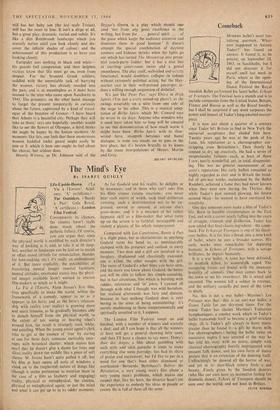Comeback
MODERN ballet's most tan- talising question, 'What-
ever happened to Antony Tudor?' has found an answer. It found it, to be precise, on September 28, 1963, in Stockholm, but I did not discover it for myself until last week in Paris, where at the open- ing of the International Dance Festival the Royal Swedish Ballet performed his latest ballet, Echoes of Trumpets. The Festival lasts a month and is to include companies from the United States, Britain, France and Russia as well as the Royal Swedes, but I shall be surprised if any work surpasses the power and impact of Tudor's long-awaited master- piece.
It is now just about a quarter of a century since Tudor left Britain to find in New York the universal acceptance that eluded him here.
Twenty years ago he was at the peak of his fame, his reputation as a choreographer out- stripping even Balanchine's. Then slowly he seemed to dry up creatively. He had a series of unspectacular failures—each, at least of those I saw, nearly wonderful, yet, in total, disappoint- ing. This was no general reassessment of an artist's reputation. His early ballets remained as highly regarded as ever and in Britain the hand- ful of pre-war works, maintained by the Ballet Rambert, achieved u fame they had never known when they were new during the Thirties. But while Tudor's past seemed glowing, his future seemed bleak—he seemed to have outstayed his creativity.
One day someone must make a film of Tudor's life. Born in -humble circumstances in the East End, and with a career neatly falling into the years of struggle, triumph and disillusion. Tudor has now added that final classic ingredient--the come- back. For Echoes of Tr Ifni pets is one of his finest- ever ballets. It is for him a break into a new kind of ballet, where he uses a broader canvas. His early works were remarkable for depicting humans; in Echoes of Trumpets, with -a savage brilliance, he depicts humanity.
It is a war ballet. A town has been defeated, its menfolk killed, its womenfoik raped. The occupying forces are brutal with the insensate brutality of animals. One man comes back to the town to see his sweetheart. He is seized and executed. The women kill a soldier in revenge, and the military casually put most of the town to death.
No, this is not a war ballet—Massine's Les
Presages was that--this is an anti-war ballet, a Green Table for our dry-eyed times. For the music Tudor has chosen Martinu's Fantaisies Symphoniques, a sombre work which in Tudor's ballet transcends itself to become a grief-stricken elegy. (It is Tudor's gift always to leave music greater than he found it--a gift he shares with. few choreographers.) Seeing the ballet twice on successive nights I was amazed at the way he has told his story with no mime, simply with classical choreography heavily impregnated with .peasant folk dance, and his own form of dance gesture that is an extension of the dancing itself. Unflinchingly he showed all the horror of war, and yet in its slate-black misery finds a sad beauty. Finely given by the Swedish dancers twho like our own have an instinctive feeling for dramatic dance), Echoes of Trumpets should be seen over the world, and not least in Britain.
CLIVE BARNES










































 Previous page
Previous page